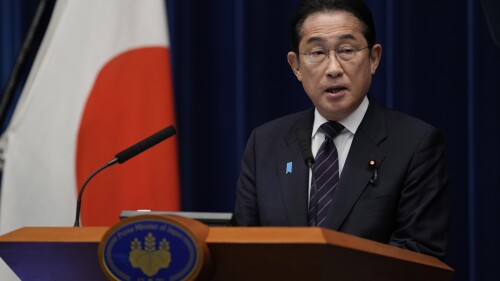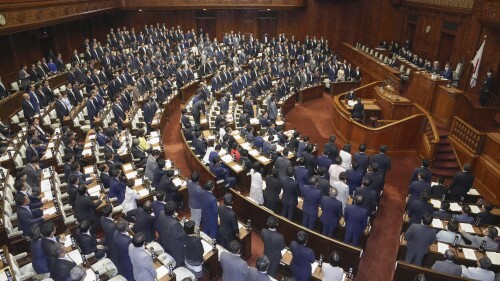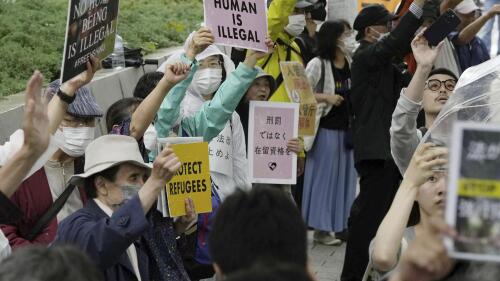Japan records steepest population decline while number of foreign residents hits new high
TOKYO (AP) — Japan’s population declined in all of its 47 prefectures for the first time in a record drop, while its number of foreign residents hit a new high, reaching almost 3 million people, according to government data released Wednesday, highlighting the increasing role that non-Japanese people play in the shrinking and aging country.
The population of Japanese nationals fell by about 800,000 people, or 0.65%, to 122.4 million in 2022 from the previous year, falling for a 14th straight year, according to data from the Internal Affairs and Communications Ministry based on residency registrations as of Jan. 1 this year.
Japan’s total population was 125.41 million, down just over half a million people from a year earlier, and there was a 10.7% jump in foreign residents with addresses registered in Japan, the ministry said.
Other news North Korea fires 2 short-range ballistic missiles after US submarine arrives in South Korea
South Korea’s military says North Korea has fired two short-range ballistic missile into its eastern sea, adding to a recent streak in weapons testing.
North Korea fires 2 short-range ballistic missiles after US submarine arrives in South Korea
South Korea’s military says North Korea has fired two short-range ballistic missile into its eastern sea, adding to a recent streak in weapons testing.
 Japan’s Kishida says he will attend NATO leaders’ summit, stresses need for dialogue with China
Japan’s prime minister says he plans to visit Lithuania in July to attend a NATO leaders’ summit as his country steps up cooperation with the Western organization.
Japan’s Kishida says he will attend NATO leaders’ summit, stresses need for dialogue with China
Japan’s prime minister says he plans to visit Lithuania in July to attend a NATO leaders’ summit as his country steps up cooperation with the Western organization.
 Lower house of Japan’s parliament passes bill to promote LGBTQ+ awareness, but not guarantee rights
The powerful lower house of Japan’s parliament has passed a bill to promote awareness of LGBTQ+ issues amid protests by activists that last-minute revisions by Prime Minister Fumio Kishida’s conservative party favored opponents of sexual equality instead of guaranteeing equal rights.
Lower house of Japan’s parliament passes bill to promote LGBTQ+ awareness, but not guarantee rights
The powerful lower house of Japan’s parliament has passed a bill to promote awareness of LGBTQ+ issues amid protests by activists that last-minute revisions by Prime Minister Fumio Kishida’s conservative party favored opponents of sexual equality instead of guaranteeing equal rights.
 Japan OKs refugee law change allowing forced repatriation of asylum seekers after repeated rejection
TOKYO (AP) — Japan’s parliament on Friday approved a revision to an immigration and refugee law that will allow the forced repatriation of asylum seekers after they are denied refugee status twice, a change that rights activists say could lead to their persecution at home.
Japan OKs refugee law change allowing forced repatriation of asylum seekers after repeated rejection
TOKYO (AP) — Japan’s parliament on Friday approved a revision to an immigration and refugee law that will allow the forced repatriation of asylum seekers after they are denied refugee status twice, a change that rights activists say could lead to their persecution at home.
The increase in Japan’s foreign population was the biggest year-on-year rise since the ministry started taking statistics in 2013. Foreign residents now account for about 2.4% of Japan’s population, the ministry said.
After peaking in 2008, Japan’s population has since shrunk steadily due to a declining birthrate. The country saw a record low of 771,801 births last year.
Prime Minister Fumio Kishida has set tackling the declining births as one of his top policy goals and pledged to secure annual funding of about 3.5 trillion yen ($25.2 billion) over the next three years for a new child care package, which includes child birth and rearing allowances and increased subsidies for higher education.
Kishida’s Cabinet last month approved a plan to expand the scope of job categories allowed for foreign workers, opening the door for future permanent residency, in a major shift in a country known for its closed-door immigration policy as it struggles with a shrinking population.
Experts say the proposed low-birth measures are mostly additional funding for existing ones and don’t address underlying problems.
They also say that Japan’s conservative government needs to do more to raise salaries, improve working conditions and make society more inclusive for minorities and those with non-Japanese roots to attract foreign workers to move to Japan and stay.
Disclaimer: The copyright of this article belongs to the original author. Reposting this article is solely for the purpose of information dissemination and does not constitute any investment advice. If there is any infringement, please contact us immediately. We will make corrections or deletions as necessary. Thank you.







